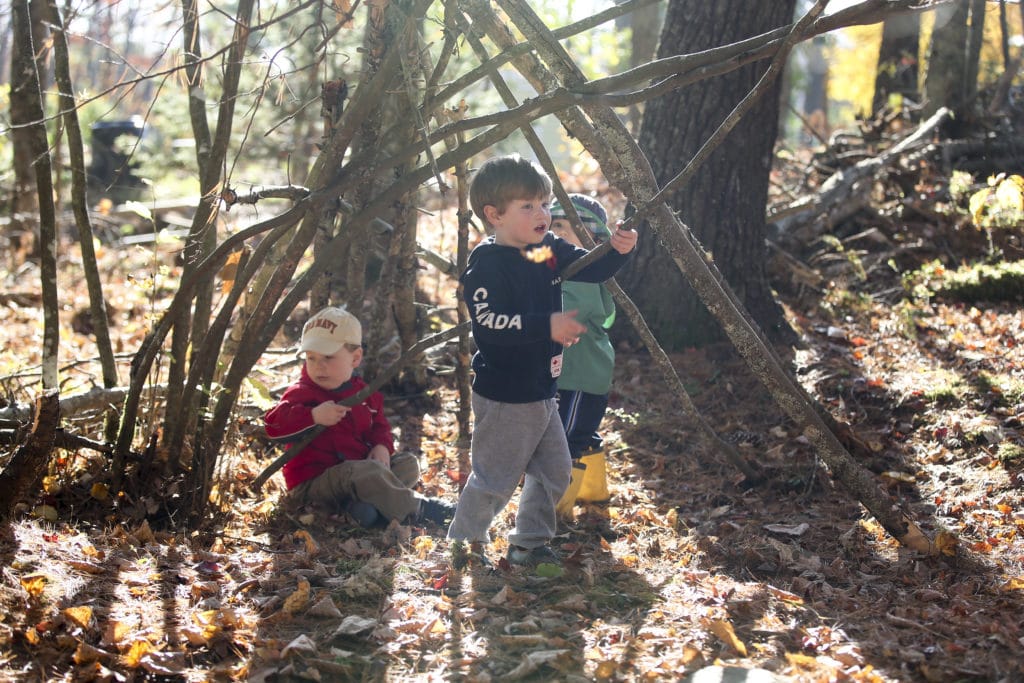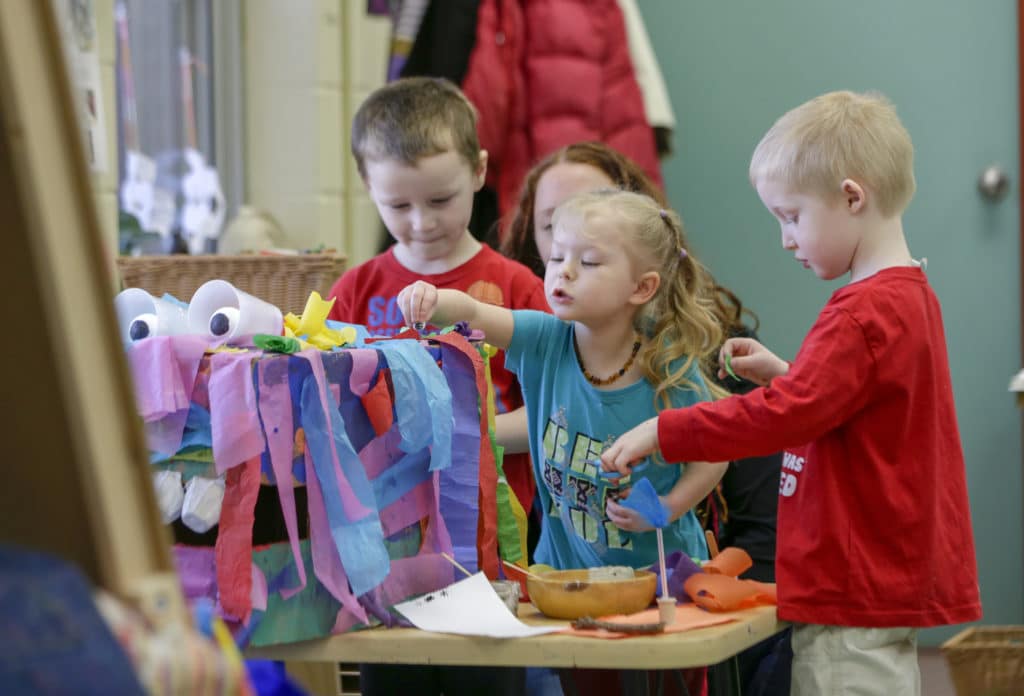Background

An early learning framework is important and exciting for many reasons. Frameworks, rather than being ‘prescriptive,’ (that is, telling us what to do and how to do it) are used as guidelines. These guidelines remind us of our knowledge base, and how to translate our knowledge into what is globally recognized as wise and innovative practices.
Read More...
‘Early learning and child care curriculum frameworks embrace children’s everyday experiences as the foundation for curriculum….in early childhood, curriculum is integrated, emerging from children’s fascination with the world and what is meaningful for them.’ (adapted from Play, Participation and Possibilities: An Early Learning and Childcare Curriculum Framework for Alberta, 2014).
A framework provides consistency. When we have a shared vocabulary and vision for children, we can work together, sharing ideas and approaches, knowing that across the province – while not providing the same programmes – we are sharing the same positive goals for children. We can become, through this shared framework, a province-wide ‘community of practice’ where educators, leaders and families understand how young children learn, and how to provide exciting and innovative ways for children to engage with their world.
The Pilot Phase
Educators from around the province have contributed to this framework, through a pilot project that involved 42 centres and represented the wide range of early childhood settings and services that exist in Nova Scotia. These centres generously offered to engage with the draft framework, through workshops, meetings, and conversations, over a period of six months. They then provided valuable feedback through an evaluation process, which was used to modify the current edition of the framework and to guide next steps.
The Plan to Move Forward:
Using the feedback from the pilot project, as well as research from across the country, recommendations were developed that encompassed:
- The need for local, community-based workshops and training, with plenty of time to reflect upon and try practices from within the modules.
- Develop leadership skills for those who will be leading educators.
- Add new topics, including learning around parent/community engagement, to the series of subject areas for in-service training.
- Continued onsite and online support as we move forward with learning about the framework.
A series of professional development modules are being developed and will be delivered in each region of the province over a two-year period. Modules will encompass all aspects of the framework, including leadership and family/community engagement, as well as some extra topics that are foundational in our work with children.
Our framework informs educators’ expectations of children and engages educators in critical thought and reflective practice (Flanagan 2017). We have a huge opportunity here; to take a thoughtful look at our own practices, collaborate with other educators, invite family input, and see our existing settings through a fresh lens. The framework will invite continuing dialogue, which in turn will guide us as we extend and enrich children’s development, learning, and care. Welcome to this exciting and ongoing journey!
English https://www.ednet.ns.ca/docs/nselcurriculumframework.pdf
French https://www.ednet.ns.ca/docs/nselcurriculumframeworkfr.pdf
Learning about the Framework
 As we move into learning about and using the new Capable, Confident and Curious, it is important to have a strong foundation from which to move forward with the types of practices described within the document. The framework is based on reflective practice and the examination of our beliefs, values and philosophies, as well as how these affect the delivery of care and learning for Nova Scotian children.
As we move into learning about and using the new Capable, Confident and Curious, it is important to have a strong foundation from which to move forward with the types of practices described within the document. The framework is based on reflective practice and the examination of our beliefs, values and philosophies, as well as how these affect the delivery of care and learning for Nova Scotian children.
Over the next couple of years, the Early Childhood Development Support Sites will be offering professional development opportunities to support the implementation of the curriculum framework.
Read More...Modules are being developed that will encompass all aspects of the framework, including leadership and family/community engagement, as well as some extra topics that are foundational in our work with children. These modules are available to leaders and educators in order to support the use of the framework in their daily practice, and will be delivered by facilitators who are local to your area.
Sessions and support materials will be available in both French and English.
As an example of how
we will begin, here are the intended topics for the first session (i.e. two modules), beginning this fall:
- Regional 2-day deliveries of Session 1 for directors or pedagogical leaders includes the first two modules: Image of the Child and Pedagogical Leadership.
- Regional 1-day deliveries of Session 1 for educators whose directors or pedagogical leaders have engaged in the training.
Throughout the following year, and into the Spring of 2020, we will continue to explore and reflect upon all aspects of the framework.
Module 1: Image of the Child
The foundation of Nova Scotia’s Early Learning Curriculum Framework is the belief that all children are capable, confident, and curious learners. In this opening module, participants are invited to reflect deeply on their own image of the child, exploring how personal values and professional practices shape children's experiences in early learning and child care programs. Grounded in the vision of joyful, intentional environments, this module sets the stage for understanding how educators can foster children’s growth by seeing and supporting them through a strengths-based lens.
Through case studies, collaborative dialogue, and meaningful reflection, educators will explore how the image of the child influences curriculum decisions, learning environments, and relationships with families and communities.
Participants will:
Explain what the Image of the Child means and how it connects to their own personal philosophy and collective ELCC program philosophy
Recognize how Image of the Child connects to educator practice and curriculum decision-making
Explore how the UN Convention on the Rights of the Child influences their image of the child and educator Practices
Improve awareness of how the Image of the Educator applies to individual professional growth and understanding of the impact of the educator role
Begin to develop a personal and collective vision that will guide professional growth throughout the NSELCF modules
Module 2: Pedagogical Leadership
Building upon the foundational concepts explored in Module 1: Image of the Child, this session invites participants to examine how pedagogical leadership shapes learning environments, decision-making, and relationships in early learning and child care programs. Grounded in the principles of Nova Scotia's Early Learning Curriculum Framework (NSELCF), the module emphasizes the influence of values, beliefs, and reflective practices on leadership at all levels - from educators to administrators.
Through case studies, collaborative dialogue, and hands-on activities, participants will explore what it means to lead with intention, embrace change, and support inclusive, inquiry-based learning for children and adults alike.
Participants will:
Recognize social pedagogy and how it connects to educator practice and the image of children as capable, confident, and curious
Practice making connections between pedagogy, values and educator perspectives in relation to early learning environments and curriculum
Understand inclusion in a broader perspective and how it impacts pedagogy and image of the child
Discuss the complexity of change and how reflection benefits ELCC practice and explore tools to support this work
Deepen their understanding of the NSELCF's five key elements and apply them in leadership and collaboration with colleagues, families, and communities
Module 3: Connecting Early Learning Principles and Practices
Building on Module 2: Pedagogical Leadership, this module provides an overview of the five early learning principles and six educator practices in the NSELCF. Participants will explore how these components relate to one another and begin identifying where they show up in their own programs. This session is designed to help educators become more familiar with and confident in using the language and structure of the framework.
Participants will:
Describe principles of early learning and how they relate to early learning and childcare programming
Identify early learning practices and their connections to curriculum decision making
Demonstrate an understanding of the interconnectiveness of principles and practices
Distinguish between principles and practices and apply them in an intentional way to everyday practice and curriculum decision making
Continue developing familiarity with the NSELCF and Educator's Guide, as foundational tools for guiding reflective and intentional practice
Module 4: Connecting Learning Goals, Learning Objectives, and Strategies
Building on Module 3: Connecting Early Learning Principles and Practices, this session supports participants in becoming more familiar with the learning goals of well-being, discovery and invention, language and communication, and personal and social responsibility. Through guided discussions and hands-on activities, participants will work with real examples from the Educator's Guide and apply strategies that align with intentional, strengths-based programming.
Participants will:
Discuss and apply the four learning goals to daily interactions, routines, and planning in early learning and child care settings
Reflect on and begin using the learning objectives and strategies that support each goal in practical, meaningful ways
Make connections between principles, practices, learning goals, and objectives, and understand how they align with the role of the educator
Strengthen their use of the NSELCF and Educator's Guide as foundational tools to support professional growth and curriculum implementation
Module 5: Inclusive Learning Environments
As part of the ongoing exploration of the Nova Scotia Early Learning Curriculum Framework (NSELCF), this module invites participants to analyze their early learning environments through a comprehensive lens. Participants will examine how environments convey values, foster a sense of belonging, and shape children's identities and learning experiences. This module offers opportunities to critically assess the design of early learning space and consider ways to make environments more welcoming, responsive, and inclusive for all children.
Participants will build on the floor plan activity from Module 3: Connecting Early Learning Principles and Practices and expanding their reflections through the learning from this module: the four elements of learning environments, Etuaptmumk (Two-Eyed Seeing), environment as the third teacher, and the role of sensory and aesthetic elements.
Participants will:
Examine the practice of Inclusive Learning Environments within the NSELCF and understand its connection to the Mi'kmaw principle of Etuaptmumk (Two-Eyed Seeing)
Assess their current environments using the four elements of learning environments to identify opportunities for accessibility, flexibility, and emotional safety
Analyze how the environment functions as a third teacher, influencing children's identities, relationships, and learning experiences
Apply knowledge of sensory and aesthetic elements to intentionally design environments that support all children's development and well-being
Module 6: Partnering with Families and Communities
This module supports educators in building meaningful, inclusive relationships with families and communities. Grounded in the principles of Nova Scotia's Early Learning Curriculum Framework (NSELCF), the module emphasizes the importance of trust, communication, and collaboration in early learning environments.
Participants will explore strategies for relationship-building, practice supportive communication techniques, and reflect on how to extend partnerships beyond the program into the broader community. Peer-to-peer learning is central to this module, with opportunities for discussion, reflection, and shared experience.
Participants will:
Identify and apply a variety of relationship building strategies to build and sustain partnerships with families
Demonstrate respectful and reflective communication skills when engaging in values-based or challenging conversations with families
Design and implement inclusive practices that invite families and community members into the program and strengthen community connections
Module 7: Critical Reflection and the Reflective Planning Cycle
This upcoming module will invite participants to explore the role of critical reflection in early learning and child care. Through discussion and practical examples, educators will begin to engage with the reflective planning cycle as a tool for deepening intentional practice and supporting responsive programming.
Coming soon - more details to follow!
Module 8: Authentic Assessment through Pedagogical Documentation
This upcoming module will focus on how educators can use pedagogical documentation to support authentic assessment in early learning environments. Participants will explore how documentation practices - such as collecting, organizing, and revisiting children's work - can make learning visible, guided planning decisions, and foster meaningful dialogue with families and colleagues.
Coming soon - more details to follow!

Children and teachers at a daycare centre in Bridgewater. The centre focuses on outside play and use of natural materials to promote learning.Photo: Megan Hirons Mahon

Children in the pre primary program at West Northfield and New Germany pre primary program. Communications Nova Scotia/Len Wagg
